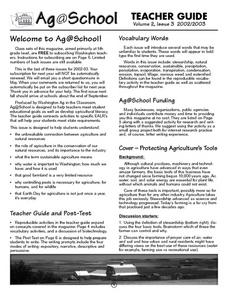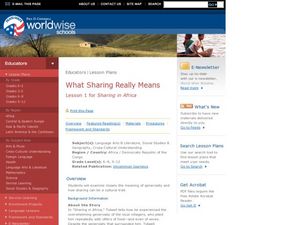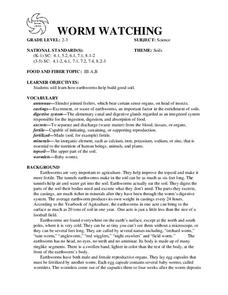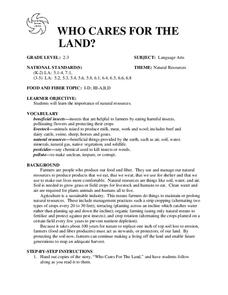Kenan Fellows
Sustainability: Learning for a Lifetime – The Importance of Water
Water is essential for life—and understanding the importance of clean drinking water is essential in understanding sustainability! Show your environmental science class the basics of water testing and treatment through a week-long...
EngageNY
End of Unit 2 Assessment, Part 1A: Fishbowl on Better Use of Water in Agriculture
Just keep swimming! Pupils participate in a Fishbowl discussion, sitting in two concentric circles and alternating between speaking and listening roles. During the discussion, they defend a claim about the best way to begin managing...
EngageNY
Forming a Research-Based Claim: Stakeholder Chart on Better Agricultural Water Management
How can industries manage water more sustainably? Building on the previous activity, scholars explore the topic by creating a stakeholder chart for agricultural water management. Next, they participate in the World Café discussion...
VT FEED
The Origins of Civilization and Agriculture: Integrating the Study of Food
What role has food played in the rise and changing nature of civilizations? Here you'll find a fantastic set of lessons and materials on such topics as where food is grown in the United States, the food of ancient peoples,...
Curated OER
Sustainable Dining
Students evaluate the how their product choices impact the environment. They discuss the concept of sustainability in agriculture. Students give reasons for buying sustainable food products. A cost-benefit analysis concerning sustainable...
California Academy of Science
Sustainable Water Solutions: Weighing the Pros and Cons
Switching indoor water fixtures to low flow reduces water usage by more than 45 percent. This and other solutions to reduce water usage have both pros and cons. Scholars view videos of different solutions, discuss them in small groups,...
California Academy of Science
Exploring Our Growing Need for Water
Pupils explore the amount of water people use in agriculture and for personal use. They compare water usage for various crops to that of raising animals before considering solutions for increased access to safe drinking water worldwide....
American Farm Bureau Foundation for Agriculture
Welcome to My American Farm!
Take a step into the virtual farm world and explore the impact farming has on our everyday eating habits. Future farmers discover the meaning of agriculture and the hard work that goes into providing food for us to enjoy. A computer game...
California Academy of Science
Exploring the Impacts of Feeding the World
Approximately 50 percent of people in the world who are chronically hungry work in agriculture. While it seems counter-intuitive, the farther you live from a farm, the more food options are available. Scholars explore concepts related to...
Curated OER
Cultivating Oklahoma's Future
In this Oklahoma agriculture lesson plan, 8th graders read and discuss information and vocabulary about new developments in agriculture. Students write essays on the future of agriculture in Oklahoma.
Curated OER
What's Organic?
Students define and discuss terms organic and synthetic, read article pertaining to organic agricultural practices in Oklahoma, complete worksheet, grow plants using both commercial and organic fertilizer, compare growth rates, and chart...
EngageNY
Gathering Information about Water Management: Assessing and Reading Internet Sources, Day 3
Water is life! Using the informative resource, scholars first read two informational articles about water management in agriculture. Then, they use a Venn diagram to contrast the different types of evidence authors use to support a...
EngageNY
End of Unit 2 Assessment, Part 1B: Fishbowl on Better Use of Water in Industry
Listen up, it's time for a Fishbowl discussion! Scholars continue their discussions about water management in industry and agriculture. After hearing both sides of the debate, pupils complete graphic organizers, deciding which sector is...
Population Connection
Meeting Human Needs
How to meet the needs of people around the globe—a question many ask. The fifth in a six-part series about human population and its effects on the globe, the eye-opening lesson includes discussion, a homework activity, and an in-class...
Curated OER
Protecting Agriculture's Tools
Students brainstorm which tools farmers can control and why. They discuss how to conserve water, air and soil. They discuss the role of farmers and how they feed the world.
Curated OER
National Worm Survey
Pupils participate in the National Worm Survey. In this National Worm Survey lesson, students generate data on earthworms. Pupils submit their data to the online database Worm Watch.
Curated OER
Era of Self-Sufficiency - Pre-1890
Students investigate the relationship between physical geography and Utah's settlement. In this Utah land lesson, students view a PowerPoint about Utah land and work in groups to answer questions about the uniqueness of Utah's Mormon...
Curated OER
Environment: Rivers of Destiny
Students investigate the results of human intervention with the Mekong. Mississippi, and Amazon rivers. After watching a video about the status of the three rivers, they complete experiments demonstrating the effects of erosion and...
Wild BC
Is Climate Change Good for Us?
Is it really that big of a deal if the global climate undergoes a little change? Young environmentalists consider this very question as they discuss in small groups the impact of different climate change scenarios on their lives, their...
Curated OER
What Sharing Really Means
Students examine the meaning of generosity and how sharing can be a cultural trait. In this cultural trait lesson, students read a text about the culture of generosity in Africa. Students complete a discussion activity and journal activity.
Curated OER
What's Organic?
Learners discuss background information presented by the teacher and read dictionary definitions for the words "organic" and "synthetic." For this gardengin lesson, students complete a worksheet on the material. Learners grow and compare...
Curated OER
WORM WATCHING
Students investigate how earthworms help build good soil. They examine the worms carefully to find the ringlike segments and swollen band at the front of the earthworm's body. Students take turns dampening the soil every day and adding...
Curated OER
WHO CARES FOR THE LAND?
Students explore the importance of natural resources. They are given copies of the story, "Who Cares For The Land," and students follow
along as the teacher reads it. Students identify the key points in the story. (Soil, water and air...
Curated OER
At Home on the Range
Eighth graders explore rangeland uses in Utah. In this Utah rangeland lesson, 8th graders read background information on the purposes of rangeland. Students work in groups to create their own ranges using peat. Students discover grazing...

























